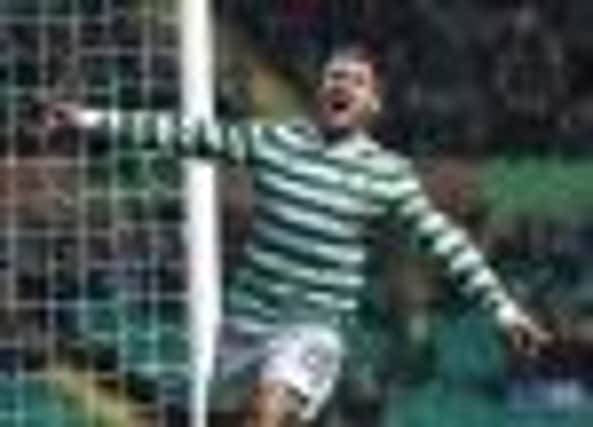Glenn Gibbons: Class act of Gary Hooper can raise Celtic expectation


This was a classic case of conferring the national title on a man who was not even the best in his own team.
Now, Charlie is very likely a nice, well brought-up boy who is good to his mammy, but he also demonstrates too frequently in defence a generosity towards opponents that could turn Neil Lennon from ginger to white without waiting for the effect of the ageing process.
Advertisement
Hide AdAdvertisement
Hide AdOn the very day of the Scottish Football Writers Association’s annual dinner in May, Hooper produced a masterpiece of irony that is unlikely to have been lost on anyone – and certainly not Lennon himself. The prolific English striker scored all of Celtic’s goals in a 5-0 leathering of Hearts in Glasgow.
Midway through the evening, Lennon, whom I hadn’t seen for some time, came over to ask after the welfare of this old sparring partner and have an informal chat. During the conversation, I said that, having voted for Hooper and sounded out one or two like-minded fellow members, it seemed unfathomable that he should have been denied the award.
“I agree,” the Celtic manager nodded. “I mean, Hoops is the type of player people pay the big money for, the guy the fans pay big admission prices to watch and the one who makes the difference between winning and failing to win. He’s been outstanding this season, and I’ll tell you another thing: he’s just going to get better.”
With the player having turned just 24 three months earlier, it seemed a virtual certainty that his manager’s prediction would be fulfilled. His youthfulness notwithstanding, Hooper had racked up 22 goals from 36 appearances in his first season at Celtic Park and 29 from 50 outings by the time of our meeting at the dinner on the last day of his second.
The strike which triggered Celtic’s 3-2 victory over Spartak in Moscow was his ninth in 13 games this season, giving him a total of 60 from 99, an extraordinary average of just about two in every three matches.
Every now and then, a forward produces a piece of work which amounts to a demonstration of his collective capability, what you might call a tapestry of the various strands of his talent.
Hooper’s goal at the Luzhniki Stadium was a prime example, combining pace, intelligent running, quick feet, instinctive spatial awareness and the instant, deadly execution of the natural predator.
It is an indicator of the general alarm he brought to the Spartak defence that he could have scored four goals in an away match at the group stage of the Champions League – and, most significantly, against higher-ranked opposition.
Advertisement
Hide AdAdvertisement
Hide AdHe did, of course, have the ball in the net with a sweet header from Georgios Samaras’s cross, but had strayed a yard offside; he would probably have scored with the opportunity he was denied by the illegal lunge of the red-carded Juan Insaurralde; and he might even have converted the penalty that should have been awarded when Kris Commons was fouled in the first half.
Lennon will have no truck with making assumptions about the course his team will take in a contest as famously difficult and complicated as the Champions League. But he should feel, even this early, entitled to a certain optimism about their prospects of outplaying their official fourth-pot seeding. In Scottish football’s present trying circumstances, that’s what success looks like.
Fletcher return welcome but don’t expect miracles
STEVEN Fletcher’s return to the Scotland squad will surely prove at some stage to be beneficial, but nobody should make the mistake of anticipating his single-handedly effecting the kind of immediate transformation of the national team’s fortunes that would qualify as a miracle.
Indeed, while the Sunderland striker’s reconciliation with manager Craig Levein hints at a reinvigorated patriotism, it may also suggest a refreshing selflessness. After all, most players in Fletcher’s position would have taken one look at Scotland’s imminent programme – World Cup qualifiers away to Wales and Belgium – and almost certainly have considered that their interests would be best served by extending the estrangement.
With their own uninspiring home draws against Serbia and Macedonia, the Scots forfeited the right to be presumptuous about their assignment in Cardiff, even against a Welsh team battered 6-1 in Novi Sad. As for Belgium, their resurgent squad has become so heavily stocked with exceptional performers that there is talk of their repeating – or even bettering – the fourth place they secured in the 1986 World Cup in Mexico.
That was the pinnacle of the most celebrated period in the country’s
history, when they not only qualified for the big event six times in
succession, but made the knockout stages on five of those occasions. Those were the days of the exceptional Jan Ceulemans, Eric Gerets, Franky van der Elst, Rene Vendereyden and Franky Vercauteren, among others. The present group includes some of the most feared and respected players in the elite teams of the English Premier League, as well as in Italy, Germany, Portugal and Spain. Chelsea’s Eden Hazard, Manchester City’s Vincent Kompany, the Sunderland goalkeeper, Simon Mignolet, Arsenal’s Thomas Vermaelen and the Everton pair, Marouane Fellaini and Kevin Mirallas, are not only expected to reach Brazil 2014, but to be among the stars of the show.
Advertisement
Hide AdAdvertisement
Hide AdFletcher’s repatriation seems already to have caused a level of whooping and hollering in some quarters that is hardly justified by Scotland’s looming schedule – or, more ominously, by a personal record that shows just one goal in eight previous internationals.